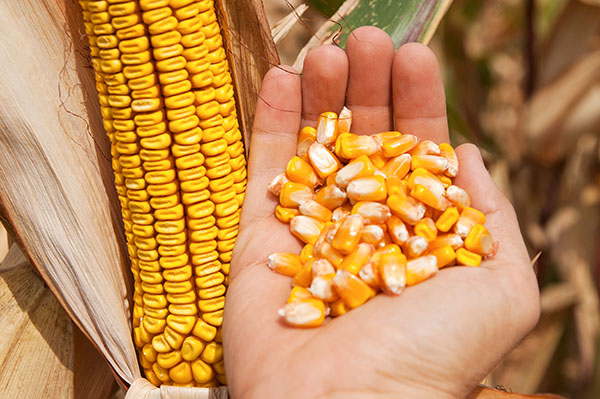“We started with a little, tiny plot out front…Every year we expanded a little bit more. Now it is a pretty major source of income, where before it was just a hobby,” Diane Vetters said. The process of growing effectively and thoughtfully is one that the Vetters have adjusted and made improvements to over the years.
Read MoreErosion can be a very gradual process. Naturally, erosion occurs everywhere. Energy in rain drops or wind detaches particles at the soil surface, then moves these mineral and carbon particles downslope or down-wind to another location. In the Great Plains and further west, this energy is most often provided by the wind. But in the east, including Kentucky, the energy is provided in the form of raindrops.
Read MoreKentucky State University announces the acquisition of a new research farm dedicated to the study of environmentally sustainable crop development. The 100-acre farm, located just outside of Frankfort, was purchased through USDA research grant funding and will support research in testing crops that can be grown in an environmentally sustainable manner.
Read MoreFor decades, environmental experts, government agencies, and concerned citizen groups have been hearing about and monitoring an area in the Gulf of Mexico that has come to be known as the Hypoxia Zone.
Read MoreHow do genetically modified crops affect the environment? TeachKyAg went to GMOanswers.com, a resource widely supported by its partners, to answer this question.
Read MoreIn 2014, the Kentucky General Assembly passed HB 448- an act relating to destruction of crops on farms by wildlife. This bill allowed landowners to kill or trap on their lands any wildlife causing damage to the lands or personal property without a tag.
Read MoreIn the 60 years since the first commercial no-tillage planting in Christian County, the agricultural practice continues to improve soils and water quality on millions of acres across Kentucky, the United States and the world.
Read MoreFarming land his grandmother once owned, Fred L. Sipes says he’s a caretaker of a precious resource. Fred began growing 50 acres of burley tobacco, fresh out of high school in 1994. Even then, conservation was important to him. He knew consistent improvement and diversification would be critical to his farm’s survival.
Read MoreAs Barry Alexander drives a tractor across a soybean field on Cundiff Farms, his eyes are on a computer screen that shows his precise location, the speed of the tractor, exactly how much seed is being planted per acre and more. He can watch the screen closely because the tractor uses autosteer to move across the field in a straight line.
Read MoreGene editing is a technology that’s making headlines for the variety of ways it can be used to improve food and benefit the environment. This is an especially exciting time as scientists are seeing their research applied in the field, leading to food that is healthier, better quality and more sustainably produced.
Read MoreTo gain some insight into the difference between pesticide-free and organic, Best Food Facts reached out to Dr. Paul Vincelli, Extension Professor and Provost’s Distinguished Service Professor, University of Kentucky.
Read MoreWhen you hear the words “firewood operation,” you may envision large, desolate sections of land absent of hickory, oak, and maple trees. That’s not the case here. As Reed looks over a tract of land they farmed for firewood in recent years, he bends down to point out oak and maple saplings flourishing on the forest floor.
Read MoreWhen farmers think of leaders in regenerative agriculture, they may not think of a farm tucked away in Carlisle County, Kentucky, or a family that has been tending the land since the Civil War. But after just a few minutes of visiting with Brad Reddick and his son, Joel, it’s easy to see that these men eat, sleep, and breathe soil health.
Read MoreFarmers have utilized their offspring to carry out the work of their operations for generations. The large families of the past may have even come about, in part, because of the need for more help on the farm. But as times have changed, equipment and processes have gotten more efficient and streamlined, so more acres of row crops can be tended with fewer people.
Read MoreMention GMOs – genetically modified organisms – and you’ll likely hear a wide range of opinions. Some believe these plants and animals have great benefits to produce food and protect the environment. Others believe they hold potential risks and should be avoided. GMOs have been in use for many years. Despite the broad scientific consensus that they are safe to eat and safe for the environment, their use has generated plenty of public dialogue, questions and curiosity about the technology.
Read MoreMr. Warren Beeler discusses how Kentucky farmers are more sustainable than ever.
Read MoreJames R. “Buddy” Smith has been farming in the Bluegrass Region for more than 50 years. He is the 2020 Kentucky Leopold Conservation Award winner.
Read MoreA land ethic was instilled in Mark Turner at a young age while helping his father on the family farm. When Mark took over Turner Farms, he saw the negative effects from the moldboard plow to the land. He decided to purchase a no-till drill in 1983. The farm now practices no-till and plants cover crops on every acre.
Read MoreNearly 1,330 acres of the property has a long history of logger choice harvest and occasional wildfire. This left mostly small-to-medium saw timber with a large percentage of low quality, less desirable species. The family has been working to improve timber quality through cull tree removal and mid-story removal for regeneration.
Read MoreAchieving soil health through the use of no-till farming and cover crops is nothing new to Edward (Myrel) Trunnell, who began farming more than six decades ago. Conservation is synonymous with his idea of farming.
Read More



















